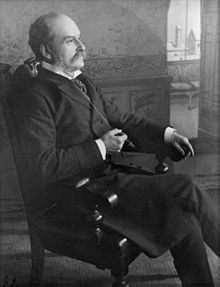Arthur Sturgis Hardy
| Arthur Sturgis Hardy | |
|---|---|

The Hon. Arthur Sturgis Hardy
|
|
| 4th Premier of Ontario | |
|
In office July 21, 1896 – October 21, 1899 |
|
| Monarch | Victoria |
| Lieutenant Governor |
George Airey Kirkpatrick Casimir Gzowski (acting) Oliver Mowat |
| Preceded by | Oliver Mowat |
| Succeeded by | George William Ross |
| Ontario MPP | |
|
In office 1873–1891 |
|
| Preceded by | Edmund Burke Wood |
| Succeeded by | Thomas Hiram Preston |
| Constituency | Brant South |
| Leader of the Ontario Liberal Party | |
|
In office 1896–1899 |
|
| Preceded by | Oliver Mowat |
| Succeeded by | George William Ross |
| Personal details | |
| Born |
December 14, 1837 Mount Pleasant, Upper Canada |
| Died | June 13, 1901 (aged 63) Toronto, Ontario |
| Resting place | Greenwood Cemetery (original) Farringdon Burial Ground (current) |
| Political party | LIberal |
| Spouse(s) | Mary Morrison |
| Religion | Anglican |
| Signature | |
Arthur Sturgis Hardy, QC (December 14, 1837 – June 13, 1901) was a lawyer and Liberal politician who served as the fourth Premier of Ontario, Canada, from 1896 to 1899.
Born in Mount Pleasant, Brant County, in 1837, Hardy was the son of Russell and Juletta (Sturgis) Hardy, United Empire Loyalists. He studied at the Rockwood Academy in Rockwood, Ontario, and became town solicitor for Brantford in 1867, a bencher of the Law Society of Upper Canada in 1875, and a QC in 1876. On January 19, 1870 he married Mary Morrison, daughter of Judge Joseph Curran Morrison.
First elected to the Legislative Assembly of Ontario in 1873, he was promoted to the Cabinet of Sir Oliver Mowat in 1877 as Provincial Secretary. In 1889 as Commissioner of Crown Lands, Hardy established the Algonquin and Rondeau provincial parks. Well known for his support of Mowat's liberalism, he was described in Grip as a hard-nosed and down-to-earth politician in Mowat’s service:
The more wickeder he is, playing euchre and swearing and entertaining thirsty strangers, the brighter does the virtue of Mowat shine by contrast.
Entering his sixties and having been in government for over twenty years, Hardy lacked the energy and strength to take the government forward or excite the populace when he succeeded Mowat as both Premier and Attorney-General in 1896. Initially reluctant to accept the positions, he said:
...
Wikipedia
